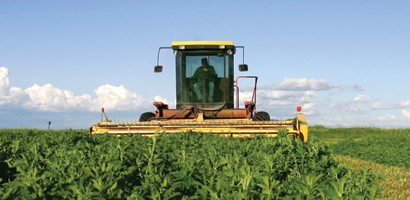A victory. But for which side?
Both sides are claiming a victory in the June 21, 2010 U.S. Supreme Court 7-1 majority ruling in favor of Monsanto. This ruling overturned the decision of Judge Charles Breyer of the U.S. District Court in San Francisco, CA, in 2005, who placed a nationwide ban on Roundup Ready alfalfa because of the possibility that it could contaminate other alfalfa plants.
Judge Breyer’s ban came after USDA’s Animal and Plant Health Inspection Service deregulated RR alfalfa and was challenged in court by the Washington, DC-based Center for Food Safety. The ban was upheld by the appeals court but then overturned by the Supreme Court.
The opinion of the court, written by Justice Samuel Alito, stated that the district court abused its discretion when it prohibited the planting of RR alfalfa in 2007. The ruling will allow the USDA’s APHIS to decide which interim measures will need to be established in order to allow growers to resume planting of RR alfalfa while they complete the Environmental Impact Statement.
In the wake of the court case, 75 house members signed a letter to USDA Secretary Tom Vilsack at the end of July urging USDA to partially deregulate RR alfalfa in time for inventoried seed to be planted in 2010. The largely bi-partisan effort, organized by Kansas Rep. Lynn Jenkins, is intended to make RR alfalfa an available option to farmers before the next planting season.
While USDA does not have authority to completely deregulate the planting of RR alfalfa until APHIS completes an EIS, the Court’s ruling does allow the department to permit interim use of previously harvested and inventoried seed.
Future of Biotech
In theory, APHIS could show that RR may have an adverse effect on the environment. But Monsanto and its supporters are not the least bit worried, and the Supreme Court case and the resulting re-introduction of RR alfalfa could set an important precedent for future biotech advances.
“Farmers have been waiting to hear this for quite some time,” said Monsanto’s alfalfa business lead Steve Welker in a press release. “We have Roundup Ready alfalfa seed ready to deliver and await USDA guidance on its release. Our goal is to have everything in place for growers to plant in fall 2010.” This would mean the seed would be available for planting in spring of 2011.
Proponents are convinced that not only will USDA give its stamp of approval, but that approval reestablishes USDA as a regulatory body which bases its decisions on science.
“The good news about the decision is that it reaffirms the USDA as the regulatory methodology of how technologies move forward,” says Mike Vande Logt, executive vice president and COO of Winfield Solutions. “It’s a strong indication that it’s about science again, asking the right questions and gathering the best data.”
In agreement is Ronald Cornish, alfalfa strategy leader of Dairyland Seed Company. “We’re happy to see regulations going back into the hands of USDA where science-based reviews can be done and we can provide farmers with tools to feed a growing population.”
Adds Andy LaVigne, president and CEO of the American Seed Trade Association: “This decision brings certainty to the regulatory process and allows seed companies to provide more cropping options for farmers.”
Supporters of RR alfalfa say there are no dangers at all to these products. Vande Logt points out that alfalfa goes into forage rather than human consumption, but, that said, the same high standards exist for RR alfalfa as are in place for crops such as corn and soybeans. Cornish says, “I do not see any real issues with biotech. However, we need to continue to go through science-based reviews for use in all crops.”
Above all, the brief period of regulation has hurt profits. Vande Logt estimates the ban has cost farmers $110 an acre, and, since the alfalfa forage goes primarily to dairy cows, and milk prices have been low, these farmers have been especially hurt.
[readon1 url=”index.php?option=com_content&view=category&layout=blog&id=45&Itemid=112″]To read more please subscribe.[/readon1]











